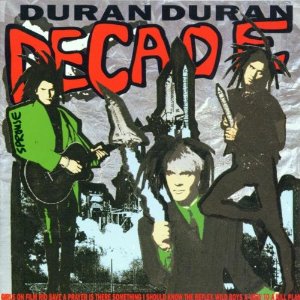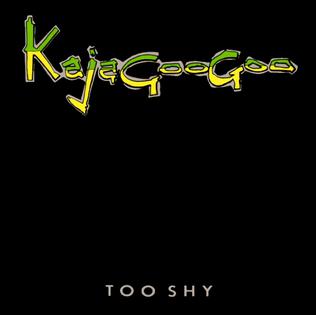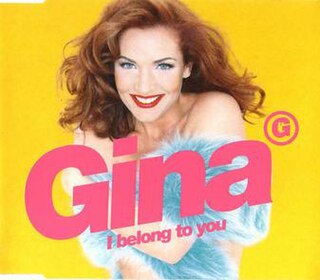
Kajagoogoo were an English pop band. They are best known for their 1983 hit single "Too Shy", which reached No. 1 on the UK Singles Chart, and the top 10 in numerous other countries.

Christopher Hamill, known professionally as Limahl, is an English pop singer. He was the lead singer of the pop group Kajagoogoo beginning in 1982, before embarking on a solo career, garnering the 1984 hit "The NeverEnding Story", the theme song for the film of the same name.

Decade is a greatest hits album by the English pop rock band Duran Duran, released on 13 November 1989.

"Hungry Like the Wolf" is a song by English new wave band Duran Duran. Written by the band members, the song was produced by Colin Thurston for the group's second studio album, Rio (1983). The song was released on 4 May 1983 as the band's fifth single in the United Kingdom, and 8 June 1983 in the United States. It reached No. 5 on the UK Singles Chart, and received a platinum certification from the British Phonographic Industry (BPI).

Now That's What I Call Music is the first album from the popular Now series that was released in the United Kingdom on 28 November 1983. Initial pressings were released on vinyl and audio cassette. To celebrate the 25th anniversary of the album and series, the album was re-released on CD for the first time in 2009. Alternative longer mixes of "Only for Love", "Double Dutch" and "Candy Girl" were included in place of the original shorter single mixes from 1983. A double vinyl re-release followed for Record Store Day on 18 April 2015. In July 2018, the album was newly remastered and re-released on CD, vinyl and cassette to commemorate the release of the 100th volume of the series.

"Make Me Smile (Come Up and See Me)" is a song by the English rock band Steve Harley & Cockney Rebel, released on 31 January 1975 by EMI as the lead single from the band's third studio album The Best Years of Our Lives. The song was written by Harley, and produced by Harley and Alan Parsons. In February 1975, the song reached number one on the UK chart and received a gold certification from the British Phonographic Industry in October 2021. It spent nine weeks in the Top 50, and as of 2015, has sold over 1.5 million copies worldwide. The song is one of the most-played songs in British broadcasting history.

"Too Shy" is a song written and recorded by the British band Kajagoogoo, released in January 1983. The first single from their debut album White Feathers, the song was an immediate hit and reached number one on the UK Singles Chart for two weeks. It was also very successful in other European countries and Japan, spending five weeks at number one in Germany, also reaching number one in Belgium and Ireland, as well as reaching number two in France and Switzerland, and number four in Sweden, Austria and the Netherlands. In the UK, it became the 13th best-selling single of 1983.

"Hey! Baby" is a song written by Margaret Cobb and Bruce Channel, first recorded at Clifford Herring Studios in Ft. Worth Tx, and recorded by Channel in 1961, first released on LeCam Records, a local Fort Worth, Texas label. After it hit, it was released on Smash Records for national distribution. Channel co-produced the song with Major Bill Smith and released it on Mercury Records' Smash label. It reached number 1 on the Billboard Hot 100 for three weeks, starting the week ending March 10, 1962.

White Feathers is the debut studio album by the English new wave band Kajagoogoo, released on 18 April 1983 by EMI Records. The album contains their most successful single, "Too Shy", a UK No. 1 hit in February 1983, as well as two other UK Top 20 hits: "Ooh to Be Ah" and "Hang on Now". It is the band's only album with Limahl as the lead vocalist.

Islands is the second album by the English new wave band Kajagoogoo, released on 21 May 1984 by EMI.

Keep on Dancing was a various artists "hits" collection album released in Australia in 1983 on the EMI record Label. The album spent 3 weeks at the top of the Australian album charts in 1983.

"Big Apple" is a song written and performed by the British band Kajagoogoo. Released in September 1983, it was the first single to be taken from the band's second album Islands (1984), and their first song without lead singer Limahl, who had been fired from the band earlier that year. From this single onwards, lead vocals were performed by bassist Nick Beggs.

"Oh Baby I..." is a song by English girl group Eternal, written by Lotti Golden and Tommy Faragher. It was the fifth single released from their debut album, Always & Forever (1993), in October 1994 by EMI and 1st Avenue. The song entered the UK Singles Chart at number seven on October 30th, climbing to its peak of number four a week later. The single spent 10 weeks in the top 40, which up to this point was their longest chart run, and was certified Silver by the BPI on 1 January 1995 for shipments over 200,000. The song also reached the top 10 in the Netherlands and narrowly missed the top 10 in Ireland and New Zealand, charting at number 11 in both countries. The music video for "Oh Baby I..." was directed by British director and editor Tim Royes.

Don't Suppose is the debut solo album by the English singer Limahl, formerly lead singer of the British band Kajagoogoo, released in 1984 by EMI Records.

"Hug My Soul" is a song by British band Saint Etienne. It was the third single from their third album, Tiger Bay (1994), and was released in September 1994 by Heavenly Records. It was written by vocalist Sarah Cracknell along with songwriting partners Guy Batson and Johnny Male.

"Hang on Now" is a song by Kajagoogoo from their 1983 debut album, White Feathers.
This article is the discography of British pop band Kajagoogoo and includes all the studio albums, live albums, compilations, and singles, as well as the peak chart positions for the United Kingdom, Austria1, Germany, Netherlands1, New Zealand, Sweden1, Switzerland and United States.

Breaking Glass is the debut album by English singer Hazel O'Connor, released in 1980 by A&M Records. It is the soundtrack album to the film Breaking Glass, featuring songs written and performed by O'Connor who also stars in the film. The album reached number 5 in the UK Albums Chart, remaining on the chart for 38 weeks and was certified Gold by the British Phonographic Industry. Two of the musicians in her band, Bob Carter and Andy Duncan, were members of Linx.

"I Belong to You" is a song recorded by Australian singer-songwriter Gina G from her debut album, Fresh! (1997). The single was released on 28 October 1996 by Eternal Records as the follow-up to the singer's highly successful "Ooh Aah... Just a Little Bit" and was her first release to be produced by Metro, who would produce the majority of her singles. Written by her with Bill Colbourne, it spent two weeks in the UK top 10, peaking at number six and spending a further 9 weeks in the top 75. The single also was a top-20 hit in Denmark, Finland, Ireland and Mexico. Its music video, directed by Max Giwa and Dania Pasquini, featured Gina G as a genie in a lamp. She performed "I Belong to You" in various TV-shows, like Top of the Pops and WOW!.

Private Lives were a British new wave band, active in the early to mid-1980s, who are best known for their 1984 charting single, "Living in a World ".



















